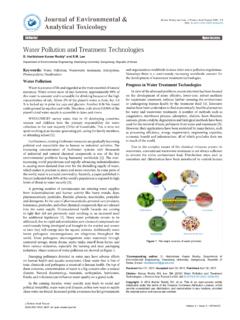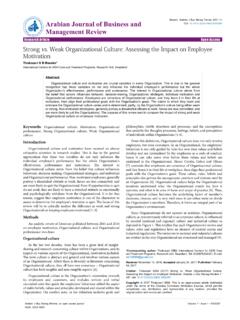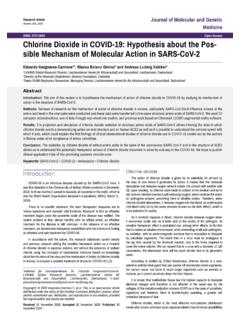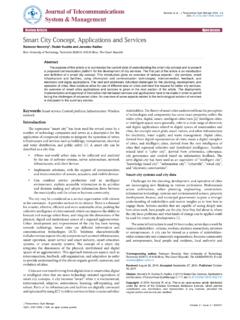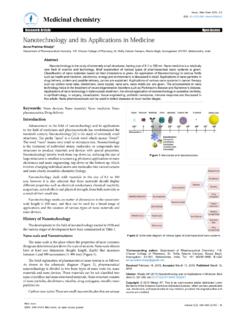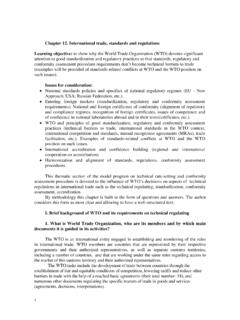Transcription of The Importance of International Trade to the Economies of ...
1 Open AccessISSN: 2162-6359 International Journal ofEconomics and Management ScienceResearch ArticleVolume 9:5, 2020 DOI: Importance of International Trade to the Economies of developing CountriesAbstractThe economic significance and benefits of foreign Trade also known as International Trade to the Economies of developing countries cannot be over emphasized. Its role and contributions to the gross domestic earnings, employment generation, economic development, and poverty reduction in these underdeveloped countries such as Nigeria, Ghana, Benin Republic, and others have been too glaring especially in agrarian Economies with fertile arable main aim of this paper is to examine in-depth the contributions and relationship between International Trade and economic development of developing African further recommends that stringent macroeconomic policies should be formulated that would encourage and increase the multiplier effect of these foreign trades.
2 Part of these policies is targeted towards exchange rates, tariffs, import and export duties, subsidies, and actions that would promote International research further concludes that foreign Trade is a key macroeconomic driver in any economy which needs to be encouraged in developing African countries as their multiplier effects have the potentials of driving the needed development goals of these nations. And for this to be achieved, these nations must come up with workable localized macroeconomic policies that suit and drive their interest as against borrowed economic policies from the developed European and Asian nations. This study made use of time series secondary data obtained from the World Bank (WDI) and the United Nations Conference on Trade and Development (UNCTAD) of developing African countries for a period between 2000 and 2019.
3 A forecast of 15 years was also initiated using these data to provide a long-term insight into the benefits of these trading activities on the GDP of developing : International Trade Economic development Tariff Import duties Export duties Exchange rateNwabueze Prince Okenna*Department of Economic Policy & Development, Gilgal Economic Foundation & Research Institute, Nigeria*Address for Correspondence: Louai Ghazieh, Professor, Greenland Economics University, France, 2020 Ghazieh L. This is an open-access article distributed under the terms of the Creative Commons Attribution License, which permits unrestricted use, distribution, and reproduction in any medium, provided the original author and source are 15 November 2020; Accepted 18 November 2020; Published 25 November 2020 IntroductionInternational Trade refers to economic activities that could involve trading between countries .
4 The items generally traded are often goods and services. These goods can further be classified into consumer and capital goods. The services that are traded include insurance, travel, foreign patent payments, etc. It is worth noting that these transactions in International Trade are facilitated by the International financial payments system and trading policies between countries . Various studies have been conducted by experts to isolate and understand factors that influence the transformation of countries at diverse rates and realized varying levels of wealth with one of these factors being International Trade . With Nigeria being a developing country with an open economy that allows transactions with various countries of the world, a sizable proportion of her total output is exported which forms part of her earnings [1].
5 According to Frankel and Romer, external Trade has been recognized as an apparatus and key driver of economic growth [2]. The government of Nigeria see exports as a powerhouse of its expansion strategies constituting a significant amount of their gross domestic earnings which has its multiplier effects on job creation, market expansion, increased GDP, and knowledge dissemination [3]. Although International Trade between nations may create room for economic growth in the country, however, it is not a rule of thumb that its overall outcome and effect are seen equally on their trading partners. This is because of the comparative advantage and absolute advantage gains countries may benefit in addition to their natural dispositions and resources.
6 Numerous determinants define the degree to which a nation may profit from a trading alliance and one of these is the International exchange rate [4]. It is worth noting that although the composition of Nigeria's foreign Trade has changed over the years since her independence, the contribution of International Trade to her development and earnings has also witnessed significant increment which was augmented by her exchange rate, trading relations, and open trading policies. The classical and neoclassical schools attributed an enormous level of significance to International Trade in any country's growth and development. The development of the world Economies has equally been linked and tied together by foreign Trade which makes up a nation's external economic relationships.
7 The Importance of foreign Trade to the macroeconomic development of any nation is indispensable. In the views of both the neo-classical and classical economists, International Trade is to an economy what an engine is to a car especially to the Economies of less developed countries , with untapped natural resources which is not limited to quantitative economic gains alone. Objective of the StudyThe principal aim of this study is to assess the contribution and significance of foreign Trade to the economic growth and development of developing African countries . Given this, this paper will also recommend macroeconomic policies that would further promote International Trade in these regionsLiterature ReviewNumerous research has been conducted to investigate the relationship and impact of foreign Trade on the economic growth and development of various countries of the world.
8 Some of the conclusions of these studies revealed a significant positive relationship exists between the export and import activities of these countries on their GDP. In 2012, Kehindeet' al adopted a rank correlational analysis to investigate the impact of International Trade on economic growth among developed countries . The result of this study revealed a positive relationship between International Trade and the GDP of these countries . In a study conducted by Frimpong Magnus & Oteng-Abayie, where they analyzed the long-run effects of Foreign Direct Investment and Trade on Ghana's economic growth from 1970 to 2002, it was observed that a long term relationship exists between the determinants of economic growth and the growth in itself.
9 Their result showed that there is a negative relationship between economic growth and its determinant, while there is a positive relationship between economic growth and Foreign Direct Investment (FDI).In another clime, Li Chen, & San in 2010 examined Int J Econ Manag Sci, Volume 9:5, 2020 Okenna 2 of 5the correlation between International Trade and the gross domestic product growth rate of East China between 1981 and 2008. In the cause of their review, they adopted a co-integration analysis and error correction model where they found out that International Trade is the backbone behind the long- and short-term growth of the GDP of their country (China).In 2013, Awe through her research deduced that economic growth is achieved when the real per-capital income of a country experienced a consistent increment over a long period.
10 It is only when this has happened that the FDI will be considered a major driver of the experienced growth. In the words of Thirlwa, at least 60 countries in the world are tagged as developing countries with over 50% of these being African countries with a population of less than 15million people. In the absence of exportation in these markets, the production of commodities would not be productive as most of the goods and services produced will be wasted due to the absence of storage and processing facilities in these regions (Thirlwa, 2000).Conceptual and Theoretical ReviewConceptual issues on International tradeThis paper also aims at shedding more insights into the concepts of International Trade not just for researchers and economists, but also to an ordinary reader.

